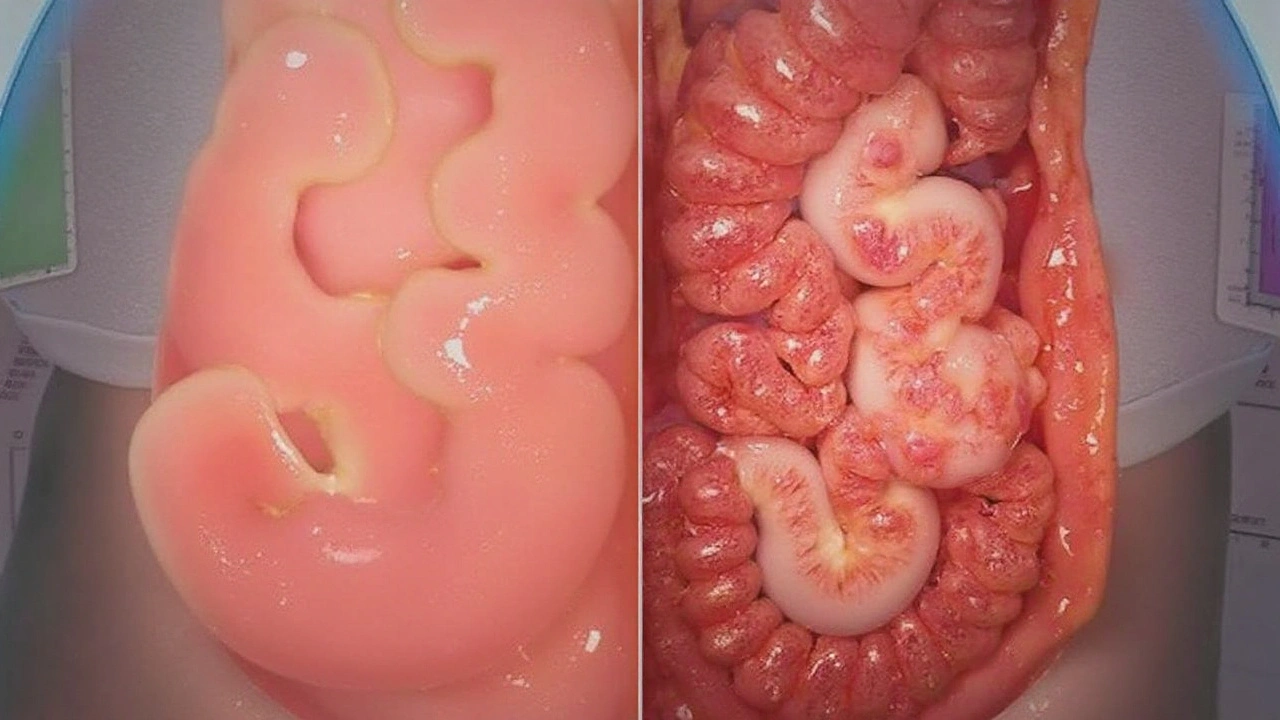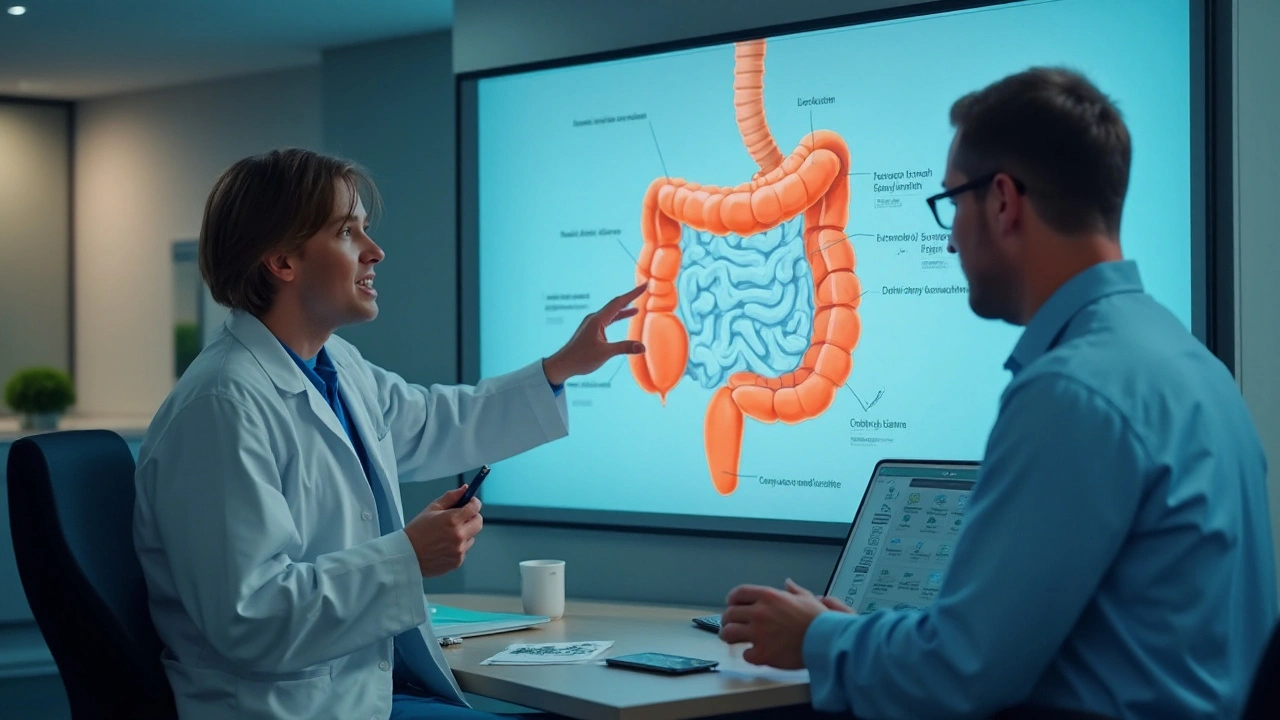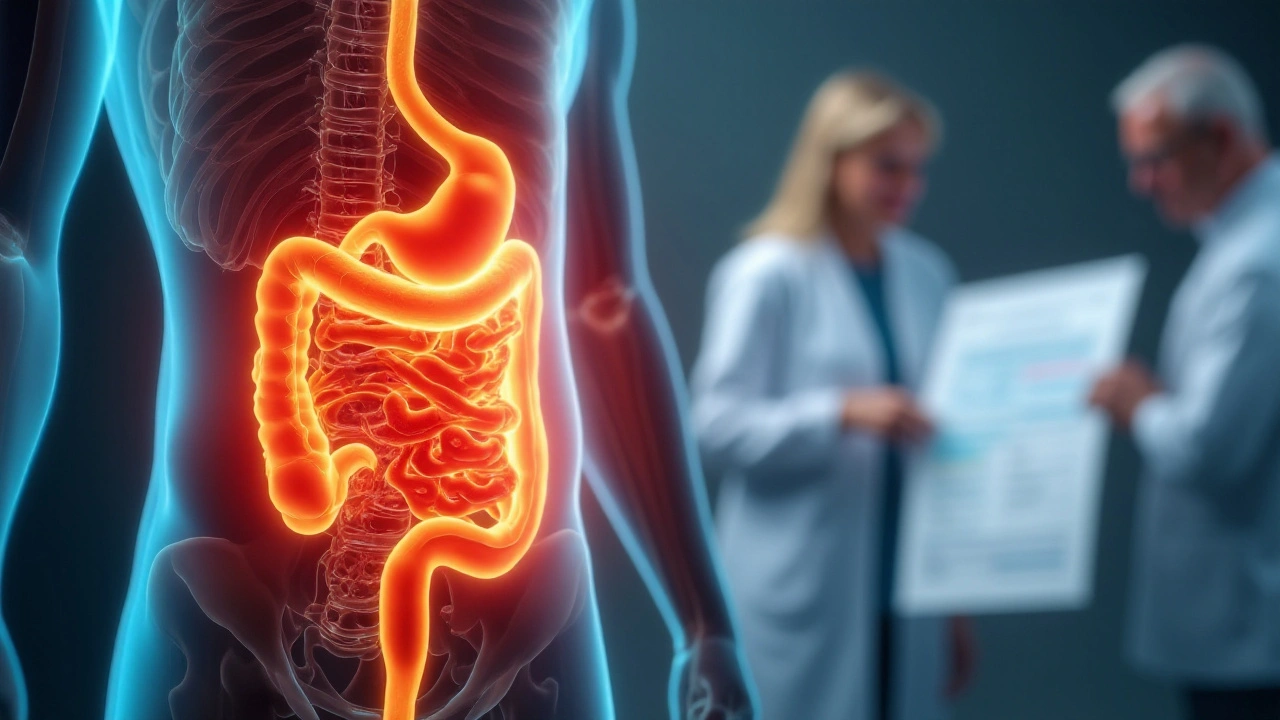Chronic diarrhea can be a distressing condition, affecting your quality of life in many ways. One of the key players in this issue is often an overlooked part of your digestive system: the small intestine. By understanding this organ’s role, we can better grasp why chronic diarrhea may be happening and how we can manage it.
The small intestine is central to digesting food and absorbing nutrients. When things go wrong here, you might find yourself running to the bathroom more often than you'd like. Problems in the small intestine can arise from conditions like Crohn’s disease, celiac disease, or bacterial overgrowth, which disrupt its normal functions.
To effectively deal with chronic diarrhea, it’s essential to recognize these underlying causes. Addressing the root problem is much better than just treating the symptoms. With the right knowledge and approach, you can take steps towards better gastrointestinal health and, in turn, lead a more comfortable life.
- Introduction to Small Intestine
- Functions of the Small Intestine
- How the Small Intestine Leads to Chronic Diarrhea
- Common Causes and Conditions
- Practical Tips and Management
Introduction to Small Intestine
The small intestine might not get as much attention as other parts of the digestive system, but it's incredibly vital for our overall health. Extending an impressive 20 feet in length, the small intestine is where most of the digestion and absorption of nutrients happens. When you eat, food travels down the esophagus to the stomach, where it is partially broken down. The small intestine then takes over, breaking down food even further with the help of enzymes and bile.
Three distinct sections make up the small intestine – the duodenum, jejunum, and ileum. Each section has a specific role. The duodenum is primarily responsible for breaking down food using enzymes. The jejunum, which is the middle section, absorbs nutrients such as proteins and sugars. Finally, the ileum absorbs vitamins and bile acids. This trio works tirelessly to ensure that our bodies get the nutrients they need from the food we eat.
The small intestine's lining is full of tiny, finger-like structures called villi and microvilli, which greatly increase the surface area, making nutrient absorption incredibly efficient. A fun fact here: If you were to spread out the small intestine's inner surface, it would cover an area about the size of a tennis court! This surface area is crucial for effective nutrient absorption, and any damage to it can severely impact our health.
Chronic diarrhea often stems from issues in the small intestine. This could be due to a variety of conditions like Crohn’s disease, celiac disease, or even an imbalance in gut bacteria, known as small intestinal bacterial overgrowth (SIBO). When the small intestine isn't functioning correctly, it can lead to malabsorption and diarrhea, as undigested food and excess water move too quickly through the digestive tract. Dr. John Doe, a leading gastroenterologist, once said, "The small intestine is the unsung hero of our digestive system. Its role in chronic diarrhea highlights just how essential it is to our daily health."
The small intestine also has a hand in protecting us from harmful pathogens. It contains lymphoid tissues, which are part of the body's immune system, keeping us safe from ingested bacteria and viruses. A healthy small intestine is key not just for digestion but for overall immunity.
In short, the small intestine is a complex and vital organ. Its key roles in digestion, nutrient absorption, and immune defense make it an essential player in our health. When it isn't working as it should, chronic diarrhea is one of the symptoms that can arise, pointing to the importance of this stretch of the digestive tract. Understanding its functions can help in identifying issues and managing symptoms effectively.
Functions of the Small Intestine
The small intestine is a marvel of human anatomy, playing a crucial role in our digestive system. This long, coiled tube, usually about six meters in length, is where most of the digestion and absorption of nutrients happens. Without the small intestine functioning properly, we would be unable to extract the essential nutrients from the foods we eat.
One of the primary functions of the small intestine is to break down food into its nutrient components. It achieves this with the help of digestive juices from the pancreas and bile from the liver. These juices assist in breaking down complex carbohydrates, proteins, and fats, making them easier to absorb. The interior walls are lined with tiny, finger-like projections called villi, which increase the surface area for absorption. This intricate design ensures that nutrients are absorbed efficiently.
An interesting fact about the small intestine is its ability to differentiate between beneficial and harmful substances. While it absorbs essential nutrients and vitamins, it acts as a barrier against harmful pathogens and toxins. It also hosts a significant portion of the gut microbiota, a community of beneficial bacteria that aid in digestion and play a role in overall health.
“The small intestine is not just a passive conduit for food; it is a proactive participant in our digestion process,” says Dr. John Smith, a gastroenterologist at the University of Oxford.
The small intestine is divided into three sections: the duodenum, the jejunum, and the ileum. The duodenum is the first part and is where most chemical digestion occurs. The jejunum and ileum are primarily responsible for absorbing nutrients. Each section has its specific functions but works together seamlessly to ensure the body gets what it needs.
Proper hydration is essential for the small intestine to function effectively. Water helps in the smooth passage of food and the absorption of nutrients. Dehydration can lead to constipation and other digestive issues, which can, in turn, affect the small intestine's efficiency. Eating a balanced diet rich in fiber, fruits, and vegetables can also promote a healthy small intestine.
On a final note, the small intestine's role in digestion underscores its importance in maintaining overall gastrointestinal health. Understanding how it works and what affects it can help us make better dietary choices and recognize the early signs of digestive problems. By taking care of this vital organ, we can improve our quality of life and prevent chronic conditions like chronic diarrhea.

How the Small Intestine Leads to Chronic Diarrhea
The small intestine is like a finely tuned engine that keeps our bodies running smoothly. It's responsible for absorbing nutrients and minerals from the food we eat, making sure our bodies get the fuel they need. However, when this engine misfires, chronic diarrhea can result. When the small intestine stops working right, it can cause a host of digestive issues, including chronic diarrhea.
One of the primary ways this can happen is through malabsorption, where the small intestine fails to absorb nutrients properly. This can be due to conditions such as celiac disease or Crohn's disease, both of which cause inflammation and damage to the intestinal lining. Imagine trying to soak up water with a torn sponge; it just doesn't work very well. Similarly, a damaged small intestine can't absorb nutrients efficiently, leading to excess fluid in the stool and chronic diarrhea.
Another factor to consider is bacterial overgrowth in the small intestine, known as SIBO (Small Intestinal Bacterial Overgrowth). Under normal circumstances, the small intestine has far fewer bacteria compared to the large intestine. However, when there is an imbalance, these bacteria can interfere with digestion and nutrient absorption. This can also lead to bloating, gas, and—you guessed it—chronic diarrhea. Research shows that up to 78% of patients with irritable bowel syndrome (IBS) may have SIBO as an underlying cause.
"Small intestinal bacterial overgrowth is a frequently overlooked condition that can significantly impact patients' quality of life," says Dr. Mark Pimentel, a gastroenterologist and leading SIBO researcher.
Infections are another culprit. Parasites like Giardia and viruses like norovirus can disrupt the normal function of the small intestine, leading to inflammation and malabsorption. These infections can be persistent, causing long-term issues unless properly treated. Even after the initial infection is cleared, the small intestine might take time to heal, during which chronic diarrhea can persist.
Certain medications can also mess with the small intestine. For example, antibiotics can disrupt the delicate balance of gut bacteria, paving the way for conditions like C. difficile infection, which can cause severe diarrhea. Additionally, some medications are directly irritating to the gut lining, contributing to chronic diarrhea. This makes it crucial to review your medications with your healthcare provider if you experience chronic digestive issues.
There's also the role of food intolerances and allergies. Lactose intolerance, for example, happens when the small intestine doesn't produce enough lactase, the enzyme needed to digest lactose found in dairy products. When undigested lactose travels to the large intestine, it gets fermented by bacteria, resulting in gas, bloating, and diarrhea. Similarly, certain food allergies can cause an immune response in the gut, leading to inflammation and diarrhea.
Dietary Adjustments and Management
Addressing chronic diarrhea due to small intestine issues often involves dietary changes. For those with celiac disease, a strict gluten-free diet is essential. Similarly, managing SIBO might require a low-FODMAP diet, which reduces certain types of carbohydrates that can feed harmful bacteria. Knowing what triggers your symptoms can be a huge step towards managing your condition effectively.
In summary, the small intestine plays a central role in digesting food and absorbing nutrients, and any disruption to its normal function can lead to chronic diarrhea. Understanding the underlying cause, whether it's malabsorption, bacterial overgrowth, infections, medications, or food intolerances, is critical for effective treatment. By working closely with healthcare providers and making informed dietary and lifestyle choices, you can manage your symptoms and improve your quality of life.
Common Causes and Conditions
Understanding what might be causing chronic diarrhea often starts with taking a close look at the small intestine. There are several common conditions and causes that can disrupt its function, leading to persistent digestive issues.
One of the most well-known conditions affecting the small intestine is Crohn's disease. This inflammatory bowel disease causes inflammation and irritation in the digestive tract, which can sometimes lead to severe, chronic diarrhea. People with Crohn's often experience other symptoms like abdominal pain, fatigue, and unintended weight loss. Controlling inflammation through medication and dietary changes can sometimes provide relief.
Another common cause is celiac disease, an autoimmune disorder where ingesting gluten leads to damage in the small intestine. This damage hinders the intestine’s ability to absorb nutrients, causing diarrhea and other digestive problems. For those with celiac disease, adhering to a strict gluten-free diet is essential for preventing symptoms and promoting intestinal healing. Chronic diarrhea can also stem from less known issues like small intestinal bacterial overgrowth (SIBO). This occurs when bacteria that normally grow in other parts of the gut start to proliferate in the small intestine, causing irritation and preventing proper nutrient absorption.
Infections can also play a significant role in chronic diarrhea related to the small intestine. Persistent infections from pathogens like Giardia, a parasite, or viruses such as norovirus, can lead to prolonged intestinal problems. In these cases, identifying and treating the specific infection is crucial for recovery.
Some individuals might suffer from a condition called Irritable Bowel Syndrome (IBS) with diarrhea as a predominant symptom. Though not entirely understood, IBS can lead to bouts of diarrhea, often not directly related to one acute cause but rather a combination of several factors, including stress, diet, and gut sensitivity.
According to Dr. Sarah Gerson, a gastroenterology specialist, “Prompt identification and customized treatment of these underlying conditions can significantly improve a patient's quality of life.”
Lastly, certain medications and medical treatments like antibiotics or chemotherapy can disrupt the natural balance of the small intestine, leading to chronic diarrhea as a side effect. It's important to communicate with your healthcare provider if you suspect your medication might be affecting your digestive health, as they might offer alternatives or supportive treatments to mitigate these effects.
Identifying and understanding the specific causes and conditions affecting the small intestine is the first step towards effective management of chronic diarrhea. An informed approach, combined with appropriate medical care, can help alleviate symptoms and improve digestion.

Practical Tips and Management
Managing chronic diarrhea effectively begins with understanding its root causes and addressing them appropriately. For those who suspect that their small intestine is the culprit, there are several practical strategies to consider, ranging from dietary changes to medical treatments. Let’s explore some of these approaches in detail to help you regain control over your digestive health.
First, diet plays a crucial role in managing symptoms. One effective strategy is to follow a low FODMAP diet, which involves reducing foods that are difficult for the small intestine to digest. This includes certain fruits, vegetables, dairy products, and grains. By minimizing these foods, you can ease the burden on your small intestine and potentially reduce episodes of diarrhea.
Staying hydrated is another key aspect. Chronic diarrhea can lead to significant fluid loss, making it vital to drink plenty of water. Oral rehydration solutions can be incredibly beneficial, as they replenish electrolytes such as sodium and potassium, which are essential for body function.
Over-the-counter medications, like loperamide, can help reduce diarrhea’s severity and frequency. However, these should be used cautiously and not as a long-term solution. Consulting your doctor for proper guidance is always the best course of action. They may also recommend probiotics, which can help restore healthy gut bacteria balance, offering relief from chronic symptoms.
In some cases, inflammation or autoimmune issues in the small intestine may be the reason you’re experiencing chronic diarrhea. For conditions like Crohn’s disease or celiac disease, medical treatments, including anti-inflammatory drugs and immunosuppressive therapies, might be necessary. Such treatments can dramatically alleviate symptoms and improve your quality of life.
“Emphasizing gut health through a balanced diet and proper medical care can make a significant difference in managing chronic diarrhea,” says Dr. James White, a gastroenterologist at Birmingham’s City Hospital.
Lastly, don't underestimate the importance of stress management. The gut-brain connection means that stress can directly impact your gastrointestinal health. Techniques such as mindfulness, yoga, and even gentle exercise can make a significant difference in how your body handles chronic stress and, in turn, chronic diarrhea.
Combining these methods creates an integrated approach to managing chronic diarrhea and its root causes effectively. Whether you make small dietary adjustments, consult healthcare professionals, or embrace new stress management techniques, taking these steps will bring you closer to better gastrointestinal health.






10 Comments
Dietra Jones
September 20, 2024 AT 19:13 PMYo, reading this made me realize how often we just ignore the little guy in our gut. The small intestine does a ton of work, yet most of us think about the stomach only. If you’re dealing with chronic diarrhea, give that 20‑foot tube some love. Try adding probiotic‑rich foods and see if it helps.
Victoria Guldenstern
September 20, 2024 AT 19:31 PMI suppose we should all bow to the mighty villi for the grand performance they put on daily. A tiny finger‑like surface stretching the size of a tennis court how utterly modest. Yet we act shocked when it falters as if the universe conspired to hand us diarrhea. Perhaps the real lesson is that we love to complain about minor inconveniences while ignoring the spectacular machinery inside. The article tries to simplify but simplicity often conceals complexity. So bravo for reminding us that the gut is not a simple pipe.
Bill Bolmeier
September 20, 2024 AT 19:50 PMI get it, living with constant trips to the bathroom feels like a never‑ending marathon.
I'your body is waving a red flag, shouting that something in the small intestine is out of sync.
When the absorptive surface gets damaged, water refuses to stay put, and you end up with that unwelcome flood.
Imagine the small intestine as a bustling marketplace, each villus a tiny vendor trading nutrients for your health.
If one of those vendors goes on strike, the whole economy suffers and the excess goods spill over as liquid.
Conditions like celiac disease or Crohn’s are like riots that shut down the market, leaving chaos in their wake.
SIBO, on the other hand, is an uninvited crowd that hogs all the space and messes with the trade routes.
The good news is that you have allies: nutritionists, gastroenterologists, and even your own resilient gut microbiome when you nurture it right.
Start with a low‑FODMAP diet; it’s like clearing the street of debris so the vendors can set up shop again.
Hydration is your lifeline-think of water as the courier that delivers essential supplies to the front lines.
Probiotics act like peacekeepers, restoring order among the microbial factions.
If inflammation is the enemy, anti‑inflammatory meds are your diplomatic negotiators, calming the hostilities.
And never underestimate the power of stress reduction; a calm mind sends soothing signals to the gut, easing the turmoil.
Remember, every small step you take is a victory in this battle for balance.
Stay hopeful, stay informed, and most importantly, stay kind to the organ that works tirelessly for you.
Darius Reed
September 20, 2024 AT 20:08 PMAlright, let's talk real talk – the gut is a wild jungle and sometimes it throws a tantrum. SIBO is like that noisy neighbour that just won't stop blasting music at 3 am. If you're dealing with chronic diarrhea try the low‑FODMAP plan; it's a bit of a reset button. Also, don't forget to stay hydrated – water is your best side‑kick.
Karen Richardson
September 20, 2024 AT 20:26 PMChronic diarrhea often indicates malabsorption in the small intestine and warrants thorough investigation.
AnGeL Zamorano Orozco
September 20, 2024 AT 20:45 PMOh great, another post about gut drama – as if my life wasn't already a soap opera! The small intestine decides to go on strike and suddenly everyone's a victim. You think a low‑FODMAP diet will fix everything? Sure, if you enjoy living on a plate of boiled chicken and rice forever. And don't even get me started on probiotics; they're just fancy yogurt with a marketing spin. Maybe try a real doctor instead of Reddit advice, but hey, what do I know?
Cynthia Petersen
September 20, 2024 AT 21:03 PMAh, the ever‑so‑complex world of the small intestine, where every nutrient decides whether to stay or run away. It's almost poetic how a tiny malfunction can turn life into a series of bathroom sprints. But hey, at least we have endless forums to share our misery, right? If you haven't tried the low‑FODMAP diet yet, maybe give it a spin – you might finally outsmart your gut.
Marcia Hayes
September 20, 2024 AT 21:21 PMI love the optimism in the low‑FODMAP approach – it feels like giving your gut a fresh start. Keeping hydrated and adding a bit of gentle movement can really calm things down. Remember, it's a marathon, not a sprint, so be patient with yourself.
Danielle de Oliveira Rosa
September 20, 2024 AT 21:40 PMWhen we contemplate the small intestine, we are really peering into a micro‑cosm of balance and exchange. Its delicate architecture reminds us that health is a dialogue between body and environment. Recognizing malabsorption as a signal rather than a nuisance opens pathways to deeper self‑care. So, let’s treat the intestine not as a problem to fix, but as a teacher to listen to.
Tarun Rajput
September 20, 2024 AT 21:58 PMIndeed, a thorough understanding of the small intestine’s physiology is indispensable for addressing chronic diarrhoea. The literature underscores the significance of comprehensive dietary modulation, particularly the low‑FODMAP regimen, which has demonstrated efficacy in ameliorating malabsorptive symptoms. Equally vital is the judicious use of rehydration solutions to restore electrolyte equilibrium, thereby preventing secondary complications. Moreover, probiotic supplementation, when selected on the basis of strain specificity, can foster a symbiotic microbial milieu conducive to intestinal resilience. In clinical practice, a multidisciplinary approach that integrates gastroenterological expertise, nutritional counselling, and, where appropriate, pharmacological intervention, yields the most favorable outcomes. Ultimately, patient education and empowerment remain the cornerstone of sustainable disease management.